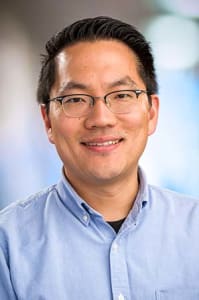John Kyung Lee

About John Kyung Lee
- A highly aggressive subtype of treatment-resistant prostate cancer has been increasingly diagnosed in men who have suffered from the disease and were treated with androgen deprivation therapy. Small cell neuroendocrine prostate cancer (SCNPC) carries an extremely poor prognosis, and targeted treatments are an unmet medical need.
- Dr. John Lee will use a novel human model system of prostate cancer to evaluate the function of N-Myc, a protein that is often overexpressed in cancer cells, in driving the onset of SCNCP. He will use a panel of N-Myc-driven SCNPC cell lines to profile molecular signaling.
- Profiling the molecular signaling of N-Myc-driven SCNPC cell lines will allow Dr. Lee to evaluate efficacy of using several currently available inhibitors to target cell cycle regulators and slow growth of these aggressive tumors.
- If successful, Dr. Lee’s research will harness the power of his team’s first-in-field SCNPC human model and cell lines to develop a breakthrough treatment strategy for this disease.
What this means for patients: Standard chemotherapy for SCNPC is highly toxic and offers short-lived benefits. This innovative therapy will precisely target dangerous prostate cancer cells, avoiding unnecessarily harsh treatments and improving outlook and quality of life for men suffering from this lethal form of prostate cancer.
Award
2015 Lori Milken–PCF Young Investigator
John Kyung Lee, MD
University of Washington
Mentor
Owen Witte, MD
Proposal Title
Therapeutic Targeting of N-Myc-Driven Human Small Cell Neuroendocrine Prostate Cancer









